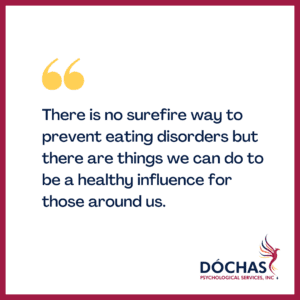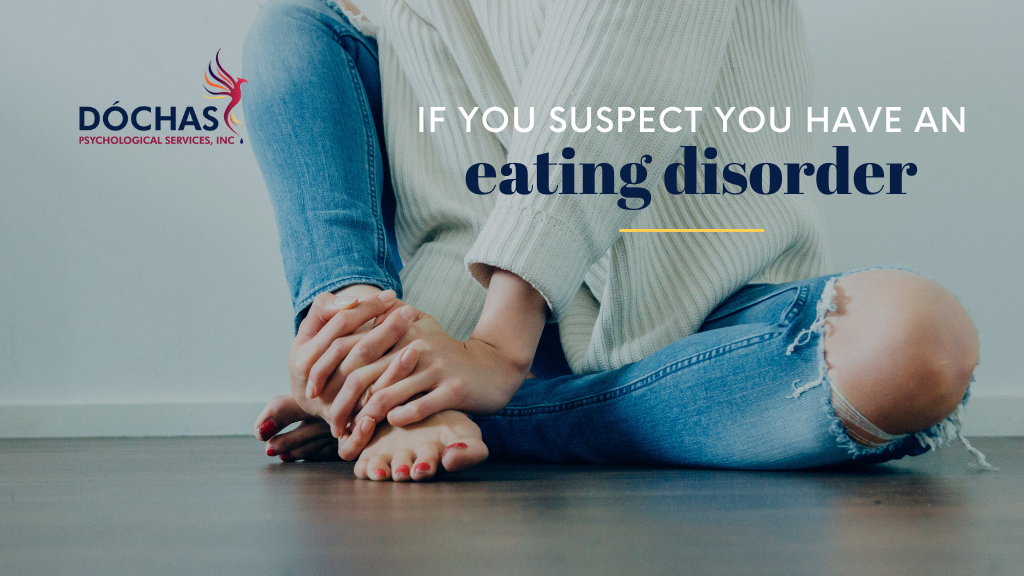Eating disorders can be a sensitive topic, and navigating them can feel overwhelming. It’s Melanie on the Dóchas blog today, and I’d like to break down what signs of an eating disorder commonly look like. People who struggle with this can be of all different types and sizes, so in reality, it is not one size fits all. I’m going to you all the details you need to know about eating disorders.

There are many different eating disorders, and symptoms can depend on the specific eating disorder in question. There are many different causes of them as well, including genetics and biological factors such as brain chemicals. Risk factors can include family history, previous mental health concerns, history of dieting, a history of weight bullying, and stress. I think that many of us can identify with one of these risk factors! The most common eating disorders include anorexia, bulimia, and binge-eating disorder.
Can Eating Disorders Be Prevented?
There is no surefire way to prevent eating disorders but there are things we can do to be a healthy influence for those around us. First, we can choose to eat a healthy, balanced diet and get a healthy amount of physical activity. And second, we can get support for mental health issues including depression, anxiety, and struggles with self-esteem and body image.
What Are the Signs of an Eating Disorder?
If you suspect an eating disorder, what are some signs to watch for? Here are some common signs:
- Excessive focus on food or healthy eating.
- Skipping meals or avoiding mealtimes.
- Avoid eating with the family or avoiding events involving food.
- Withdrawing from social activities.
- Frequently looking in the mirror and commenting on perceived flaws.
- Eating a limited diet or frequently eating large amounts of food.
- Ongoing worry or complaints about weight and excessive talk of weight loss.
- Using laxatives, dietary supplements, or other products for weight loss.
- Excessive exercise, even when injured.
- Leaving during or right after a meal to use the bathroom.
- Negative talk about eating habits.
- Secretive eating.
Stages of an Eating Disorder
Knowing what the different stages of an eating disorder can look like can help you recognize one in you or someone you love. These are the stages someone commonly goes through:
- Precontemplation: You are unwilling to acknowledge you have a problem. You respond to the suggestion with defensiveness or hostility.
- Contemplation: You can admit you have a problem, but the fear of change can be strong.
- Preparation: You are ready to change but are unsure as to how to proceed.
- Action: You are ready to implement a plan to confront your eating disorder. This stage could include treatment.
- Maintenance: You are actively engaging in adaptive behaviours and new ways of thinking.
- Relapse: Recovery is not always a straight path and can include setbacks or “relapse.” This involves slipping into earlier behaviours and thoughts.
- Recovery: Recovery is different for everyone. Some are still healing, while others feel recovered, occasionally facing eating disorder symptoms but leading a satisfying life. Many fully recover, no longer struggling with disordered thoughts and behaviors related to food and body.
What are the Ways to Support Someone with An Eating Disorder?
First of all, if you are struggling with an eating disorder, remember—it’s not your fault! There are many factors that contribute to developing this.
If it’s someone you know who is struggling and you’re wondering how to help them, remember first of all that many factors are involved. Your loved one is not to blame! The next step is to acknowledge how difficult this is for your loved one. You can begin to educate yourself about eating disorders. Be open with your loved one and invite them to share how they are thinking and feeling, without judgement. And then try to avoid discussions of weight, shape, food, and diets, while modelling a balanced relationship with food and exercise. and ask your loved one what you can do to help.

Do you suspect you may be struggling with an eating disorder? There are different places to find help. Dóchas Psychological Services has several practitioners who can provide support. Support can include determining if you have trouble with your relationship with food and steps that can be taken toward recovery. There are also several online 12-step meetings available to learn more about eating disorders and gain support and help from others in the same position you find yourself in.
You can reach out to us here at 780 446 0300 or drop us a line at info@dochaspsych.com.
References:
- Eating disorders, Mayo Clinic.
- Helpful Strategies for Supporting Someone With an Eating Disorder.
- Supporting Someone With an Eating Disorder.
- Eating Disorders Anonymous Meetings.
About Dóchas Psychological
Dóchas Psychological Services is a well-established and trusted therapy clinic located in Spruce Grove, Alberta. At Dóchas we value the idea that everyone deserves a safe space. Through connection and education, our team works hard to build a trustworthy relationship with each of our clients. It is our goal to create a community for our clients to feel like they belong.
Disclaimer
Information provided through Dóchas Psychological Services blogs or vlogs is meant for educational purposes only. They are NOT medical or mental health advice. You can read more about our disclaimer here.

